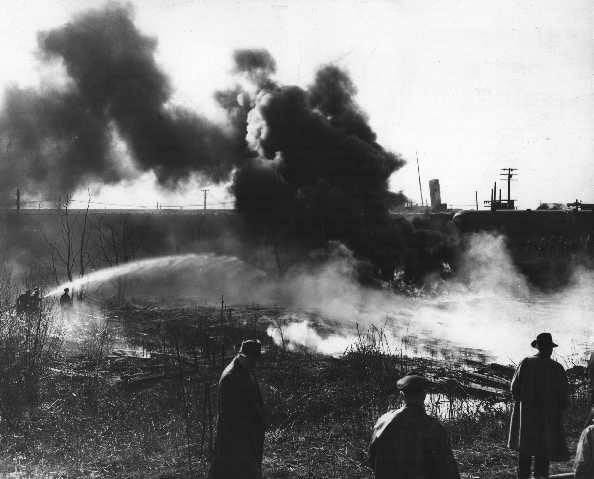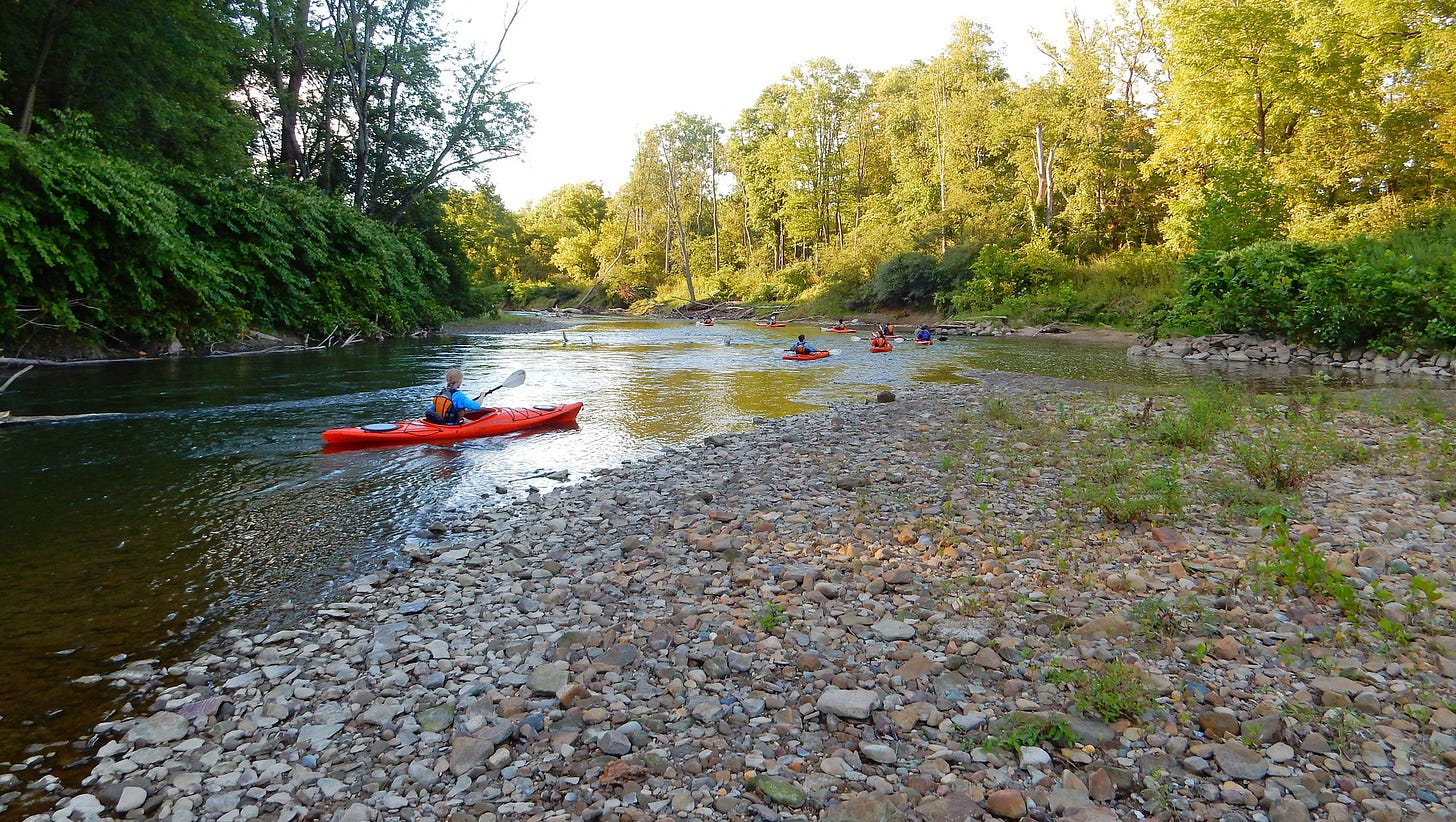The Cuyahoga River Burned in 1969, and America Paid Attention. Will We Put Out the Flames This Time?
A polluted river caught flames and helped fuel the environmental movement of the 1970s
On June 22, 1969, flames leapt from the surface of the Cuyahoga River in Cleveland, Ohio. Not from a ruptured gas line or some freak accident—no, the river itself was on fire.
Choked with industrial runoff, oil slicks, and chemical waste, it combusted on a Sunday morning. It wasn’t even the first time the Cuyahoga had burned. It had burned more than ten times before.
To locals, this wasn’t even newsworthy either. It was normal. No one thought the river wasn’t polluted. Everybody knew. No one cared. In fact, pollution was considered a good thing at the time, an indication of a growing economy and industrial progress. Jobs were plentiful.
“Fundamentally this level of environmental degradation was accepted as a sign of success,” wrote David Newton in Chemistry of the Environment.

But this time, it was the nation—the world—that noticed.
Time Magazine published a story about the June 21 river fire on August 1 (along with a photo of a previous fire). In the article, the Cuyahoga River was described as a river that “oozes rather than flows” where someone “does not drown but decay.” The story quickly spread to other publications, both in the U.S. and abroad.
That image—a river, a supposed source of life, in flames—became a turning point. It was ugly. It was shameful. And it was exactly the slap in the face America and its out-of-control industrialization needed.
In the years that followed, a groundswell of public outrage forced change. The Environmental Protection Agency (EPA) was created in 1970, the very first federal agency that would regulate pollution.
The National Environmental Policy Act (NEPA) of 1970 ensured the public had a voice in federally funded projects. In 1972, Congress passed the Clean Water Act.
We decided that breathing clean air and drinking safe water weren’t luxuries, but rights—necessities.
The burning Cuyahoga River lit a fire under a generation.
And yet, here we are—fifty-six years later—staring into the smoke again.
America, We’re Back at the Riverbank
Only this time, the flames aren’t so visible. There’s no dramatic blaze to photograph (even though, surprisingly, no one actually managed to take a photo of the June 21 Cuyahoga River fire). Now, there’s no burning slick to shame us into action.
Instead, it’s a slow, suffocating erosion of protections. Environmental death by a thousand legal cuts.
Court decisions hollow out the Clean Water Act. Politicians, obscure agencies like DOGE, and even the Supreme Court gut NEPA under the guise of “efficiency.”
Attempts to hand over public lands to industry take place behind closed doors and in the middle of the night.
What we fought so hard to preserve in the wake of Cuyahoga is being unraveled, rule by rule, acre by acre.
We are watching it happen in real time. Almost every day, there’s a new story.
In a nation that once treated the environment as sacred ground, we now see political leaders calling for the sale of federal land to the highest bidder. We see wetland protections vanish with a stroke of the Supreme Court’s pen. We see the extraction of oil and gas prioritized over clean air, clean water, and the voices of Indigenous nations whose lives are tied to the land.
The Legacy We’re Squandering
When the Cuyahoga caught fire in 1969, Americans across the political spectrum said “enough.” Richard Nixon—yes, Nixon—created the EPA. Senator Edmund Muskie, a Democrat from Maine, led the charge on the Clean Air and Clean Water Acts.
Republicans and Democrats alike understood that pollution was not partisan. Dead rivers don’t check your voter registration.
But now, decades later, we’ve allowed the environment to become a wedge issue. We’ve let the health of our children, the purity of our rivers, and the safety of our public lands become bargaining chips in the political casino.
They call it “energy independence.” They call it “cutting red tape.” But let’s call it what it is: willful blindness. Unlimited greed. Dollar signs in politicians’ eyes—like obsessed cartoon characters.
It is choosing short-term profits over long-term survival. It is putting the power of polluters over the rights of the people. It is a betrayal of every person who stood up in the 1970s and demanded better for this country’s land, air, and water.
Let’s stop pretending this is normal. It isn’t.
The Slow Burn of Public Land Sell-Offs
Public lands are under siege—quietly, methodically, and in some cases, permanently.
Laws like NEPA once ensured that the public could weigh in on development plans. Now those reviews are rushed or skipped altogether—even in national parks, which are supposed to be the most protected places in entire country.
Interior Secretary Burgum literally brags about this.
Tribal consultation, required by law and basic decency, is often reduced to a box to check. Protections for national monuments are weakened, endangered species left vulnerable, and climate considerations deliberately scrubbed from policy analysis.
Vast tracts of land in Alaska are opened up to oil and gas drilling, while protection of the the region’s immense numbers of wildlife—enormous herds of caribou, polar and grizzly bears, beluga whales, walruses, and wolves—isn’t even mentioned.
We’re not just rolling back environmental regulations. We’re rolling back values.
In 1969, the Cuyahoga River fire showed us what happens when you ignore the environment long enough. Now, in 2025, we’re doing it again—but with a greedy smile, a photo op, and a press release.
Mineral leases in pristine wildlife habitat. Logging roads through old-growth forests. Pipelines across sacred land.
And somehow we’re supposed to believe this is progress? More than half a century ago, this so-called “progress” literally set a river on fire. A river.
We’ve Been Warned
The planet is screaming. The American West is drying out. Wildfires tear across landscapes once considered temperate. Farms run out of water. Hurricanes grow stronger. The oceans are acidifying and rising. Species vanish. Our lungs burn with wildfire smoke while policymakers sign off on more drilling.
Meanwhile, we pretend it’s business as usual.
The truth is, the Earth doesn’t need us to save it. It’s we who need saving—from our arrogance, our shortsightedness, and our silence. The laws born partially from the Cuyahoga fire were not just pieces of legislation—they were declarations of moral responsibility. They said that we, the people, had a right to a clean and livable planet.
Those laws are being dismantled. And it’s happening right under our nose.
We Must Be the Alarm
History isn’t just a collection of dates—it’s a series of choices.
After 1969, Americans chose to act. They demanded a cleaner, safer future. And they didn’t do it with hashtags or outrage tweets.
They did it with marches, lawsuits, grassroots organizing, and relentless pressure.
The Cuyahoga River is now actively being restored and part of a beautiful national park—Cuyahoga Valley National Park, which is one of America’s most visited parks.
So what’s stopping us now?
We cannot wait for another river to burn, another city’s water to turn brown, another forest to disappear. The signs are all around us. And unlike the Cuyahoga fire, today’s disasters are global, systemic, and existential.

This Is About More Than Politics
If you hike, hunt, fish, photograph, birdwatch, bike, camp, breathe, or drink water—you are part of this.
If you live near a river, a refinery, or a forest—you are affected. Public lands belong to all of us. Clean air belongs to all of us. We all have a right to clean water.
This isn’t about left or right. It’s about right and wrong. It’s quite literally about our own future. We all live in “the environment.”
The Cuyahoga didn’t catch fire because people were evil. It caught fire because people didn’t care. Because profit was easier than prudence. Because silence was easier than confrontation.
We’re at the same crossroads again.
Light the Fire—This Time With Our Voices
We are heirs to a movement born in fire. But inheritance is not enough. It must be defended.
That means calling your representatives. It means opposing public land sell-offs and crippling budget cuts, demanding strong environmental oversight, and voting like the quality of your life depends on it. Because it does.
In 1969, a river burned. And America woke up.
Now it’s 2025. And this is our generation’s moment.
Here’s How to Take Action to Protect Public Lands
There are a number of easy and convenient ways to voice your opposition to the selling of public lands:
Call your senator at 202-224-3121.
Contact your senator via 5calls.org.
Fill out the “Stop the Senate’s Plan to Sell Off Public Lands” form provided by Outdoor Alliance.




